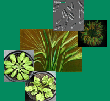Phytochelatin Synthesis
The synthesis of phytochelatins (PCs), small glutathione-derived peptides, is essential for the detoxification of Cd2+ ions in plants, some fungi and certain animals.

Arabidopsis thaliana and Schizosaccharomyces pombe mutants deficient in PC synthesis are hypersensitive to Cd2+, arsenate and arsenite (AsO43- and AsO2-). Genes coding for the responsible enzyme, phytochelatin synthase (PCS)(EC 2.3.2.15), were cloned for the first time from Arabidopsis thaliana, wheat and fission yeast (Ha et al., 1999; Vatamaniuk et al., 1999; Clemens et al., 1999). Early surveys shortly after the discovery of PCs indicated that PC formation is ubiquitous in the plant kingdom. Accordingly, a large number of PCS homologous sequences has been found in recent years. However, this apparent ubiquitous presence of PCS genes at least among all higher plants is surprising. Given the fact that Cd and As ions are present at potentially growth-inhibiting concentrations in a very limited number of habitats, it is not clear how the need to detoxify these non-essential toxic metals and metalloids could have provided the selective pressure that would explain the almost universal presence of PCS genes in the plant kingdom. We are interested in identifying possible other functions of PC synthases and are therefore studying various plant and fungal PCS mutants as well as bacterial proteins with similarity to PC synthases. PC synthases are constitutively expressed yet PC synthesis occurs only when triggered by exposure to metal ions. We are interested in the mechanisms of activation. Metal binding to proteins is of general importance because in recent years it has become increasingly clear that aberrant metal-binding might be implicated in several human disorders.

